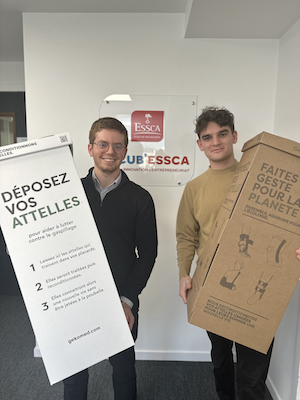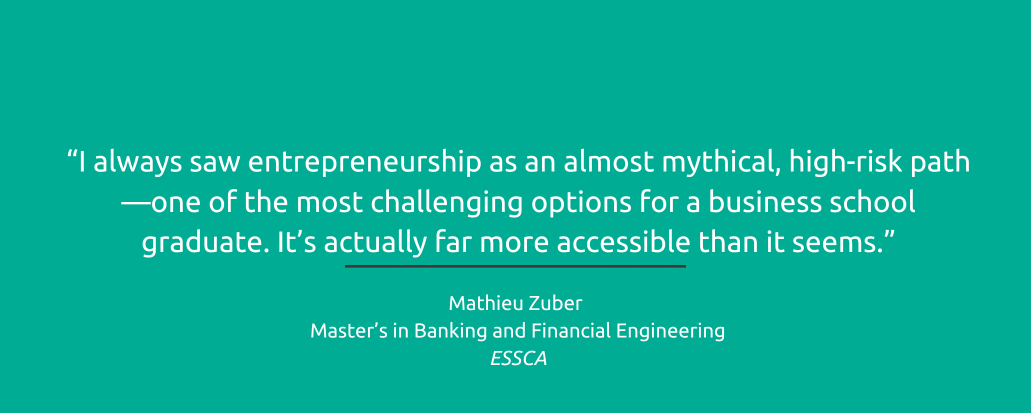After recovering from a mountain biking accident, Mathieu Zuber (pictured left below), a banking and financial engineering Grand école graduate from ESSCA was left in a quandary. How could he dispose of the knee brace that had aided his rehabilitation? Feeling that there must a better solution than the trash can, Mathieu tried to find a more environmentally friendly solution. Finding none, he and a bunch of entrepreneurially minded colleagues started their own venture to fill the gap.
In this edition of My Business Story, Mathieu discusses his sources of inspiration, the challenges he has encountered, and how business school experience ignited his entrepreneurial spirit.
Tell us about your business?
Gekomed is a company with two core activities. First, we collect and refurbish used orthopedic braces—knee, wrist, shoulder, and the like—and second, we design, manufacture, and sell eco-designed orthopedic braces built to be refurbished. Our unique value proposition lies in this dual approach: creating a circular economy for orthopedic devices while also innovating in sustainable medical product design.
On the collection side, we partner with hospitals, clinics, pharmacies, and healthcare networks to install collection bins for used braces. To date, we’ve deployed around 250 collection points across the Paris region. We’ve also just launched in the Lyon area and are expanding to the Montpellier and Rennes metropolitan areas, with Marseille next in line. We’ve already collected tens of thousands of devices.
This initiative aligns with recent legislation in France that will soon allow reconditioned medical devices to be reimbursed by national health insurance. (The law has passed, and the application decree is already published—only a few ministerial orders are still pending.) While we wait for full domestic market access, we currently export refurbished braces outside the EU, though at lower margins.
On the eco-design side, thanks to early fundraising, we’ve set up a scientific advisory board of around 30 orthopedic surgeons. With their help, we’re developing several lines of sustainable braces. Our first product line—a range of eco-designed knee braces—is launching this month. It’s covered by a patent we recently filed. These braces are sold in France for now, via our website, but we plan to build a broader distribution network soon.
What inspired you to start Gekomed?
The inspiration came after I personally suffered a knee injury and had to wear a brace for three weeks. Once I no longer needed it, I had no idea what to do with it—it ended up forgotten in the back of my closet. It felt like such a waste. Around the same time, I met an orthopedic brace fitter who had been thinking about launching a business to give a second life to used braces. That conversation sparked something. It made me realize how widespread this issue is and how much value is lost. That’s when the idea for Gekomed really started to take shape.
The idea emerged in October 2023, following that personal injury and the encounter with the brace specialist. The timing was perfect—there was increasing awareness around circular economy solutions in healthcare, and upcoming regulatory changes in France encouraged us to act quickly.
Tell us about the business today?
We have a small core team of four co-founders, supported by three employees, as well as several interns and apprentices who assist us across various projects. Around this core, we’ve built an extended ecosystem of subcontractors—for logistics, the collection and maintenance of used bins, the refurbishment of orthopedic braces, and the production of our eco-designed models.
In addition, we collaborate with a scientific advisory board made up of 30 orthopedic surgeons who play an active role in guiding our product development and validating clinical needs.
Our commercial activity officially began in 2025, and we are projecting a turnover of €300,000 for this first year.

What part did your b-school experience play in developing your business idea?
My business school experience played a major role in nurturing my desire to start companies. During my studies, I came up with several startup ideas and even launched one called Morning Baguette, a logistics and delivery service for bakery products. I also started a digital agency focused on web development and online services.
Business and entrepreneurship are deeply rooted in the culture of most business schools, and that environment really activated my entrepreneurial mindset from my first year. The foundations were laid at school, but they were quickly challenged and shaped by the realities of running an actual business.
In what ways do you draw upon the skillset you developed at b-school?
Business school gave me solid fundamentals in areas like financial management, sales, pitching, business law, communication, and marketing—all of which have been incredibly helpful in launching and structuring our company. That said, the best learning still comes from doing. Starting a business forces you to adapt constantly and apply those skills in real-world conditions, which is very different from the classroom.
How would you describe a typical day at work?
That’s the beauty of entrepreneurship—there’s no such thing as a typical day. Each day involves juggling a wide range of tasks: commercial efforts like pitching and meeting clients, fundraising (whether it’s private investment or public grants), legal matters such as patent filings and regulatory compliance, and financial management with our accountants.
Then there are all the specific challenges tied to our field—I’ve spent weeks testing cleaning and disinfection methods for used braces, developing prototypes, managing production logistics, and working closely with our partners. The work is extremely diverse, which is exactly what I love about it.

How has your b-school network helped with your business development?
It has been incredibly helpful. I had the opportunity to join my school’s incubator right at the beginning, which gave me access to mentoring and structure. We’ve also benefited from alumni connections—some of them are now leaders or founders of pharmacy networks or are active in the hospital sector. These introductions have led to key partnerships and valuable advice.
What have been some of the biggest obstacles you've encountered?
One of the biggest recurring challenges has been the lack of initial technical or sector-specific knowledge. As young founders, we had to learn everything very quickly—how to raise funds, how to develop medical devices, how to build partnerships, how to file a patent, and how to create a reconditioning methodology from scratch.
Each new step felt like climbing a mountain. The key has been to absorb as much information as possible in a short time and to surround ourselves with the right people—co-founders, consultants, employees, and investors who bring the skills we didn’t have initially.
Where would you like the business to be in five years’ time?
In five years, I would like Gekomed to have secured a significant share of the orthopedic brace market in France, with a complete range of eco-designed braces covering all body areas. Our goal is to become one of the top five players in the sector nationally and to begin scaling internationally within the European Union—ideally in at least five or six countries.
Depending on how local legislation evolves, I also hope we can expand our circular model into other areas of medical devices, which is a highly polluting sector that urgently needs sustainable alternatives. I want Gekomed to have full national geographic coverage in France and to act as a key driver of change toward decarbonizing the healthcare industry.
What is one surprising thing you’ve learned from starting your venture?
Before launching the business, I always saw entrepreneurship as this almost mythical, high-risk path—one of the most challenging options for a business school graduate. And while it definitely requires a massive personal investment, I’ve come to realize that it’s actually far more accessible than it seems.
If you’re willing to fully commit, it becomes an incredibly enriching journey that allows you to gain skills at a pace that no traditional job could ever match. It’s a steep learning curve, but it’s also one of the most empowering professional experiences anyone can have.
What advice would you give to someone thinking about starting their own business?
My biggest advice would be: don’t try to do it alone. Surround yourself as early as possible with people more experienced than you—in both entrepreneurship and the specific industry you’re entering.
Also, don’t feel pressured to choose a trendy or saturated sector. Sometimes, the best opportunities lie in less glamorous industries where competition is weaker, and established players are slower and less agile. That’s where startups can really make a difference.


